What does Santa Claus represent?
Christmas is a fascinating amalgam of a holiday made up of a great big storm of European traditions, so there is obviously more than one answer to this question. But when the holiday blues set in and it feels like there is nothing more to Christmas than fighting with relatives and struggling to find perfect gifts, it’s as good a time as any to remember what Santa Claus really brings us every December: Magic.
Origins of Saint Nicholas and Sinterklaas and maybe Odin aside, the modern day lore around Santa Claus can be just as captivating… but it often gets lost this time of year. We’re all so caught up in the bustle and frenetic energy that encompass the season, everything around it fades into a cacophony of carols that we wish we didn’t have to listen to in the mall. Are the greeting cards out? Can I even send cards this year? Can I find everyone on my list something that they’ll love and won’t regift the next day? How many parties do I have to attend? How much money have I already spent? Am I making the eggnog this year or the pie or the ham? It seems that the older we get the more the stresses pile on, determined to sap the enjoyment out of something that used to be suffused with excitement and tradition and safety.
The mythology of Santa Claus was always important to me personally; as a kid who never attended religious gatherings of any kind, Santa Claus was pretty much the point of Christmas. It took me some years of distance to actually notice the investment I had in Santa as a figure, a cultural fulcrum that I had hung so many hopes and dreams upon as a child. In an effort to work it out, I thought back over all of my favorite stories featuring the jolly old guy and finally cracked the code: In every one, Santa brought magic into people’s lives, not gifts.
* * *
I’ve written about my love for The Polar Express around these parts before; needless to say that book by Chris Van Allsburg probably shaped this expectation in me. The idea that a bell from Santa’s sleigh could only be heard by people who truly believed in the existence of Santa’s Workshop at the North Pole? That this was the item a young protagonist would ask for upon being granted the First Gift of Christmas? It made the holiday about something very different for me. It was about asserting my own belief in favor of magic in my life. It became less ephemeral and turned toward the tangible, something I could grasp and control for myself. No one could make me believe in the North Pole—I had to make the decision on my own, and properly-addressed gifts under a douglas fir tree had nothing to do with that.
* * *
The Christmas classic Miracle on 34th Street has much the same message. The character of Kris Kringle—the real Santa Claus—becomes the hired Santa for Macy’s Department Store because he notes that their current actor is drunk on the job. While consumerism is still at the heart of the tale, taking place in one of New York’s most famous holiday shopping destinations and dealing with a tidal wave of parents anxious to get the right toys for their children, all the basic themes center around love and connection and the power of belief. Kringle’s honesty in his position as the Macy’s Santa leads to him recommending that customers go to the rival department store Gimbels when they have a better product (because the real Santa would never mislead you on quality at the very least). This policy leads to a reconciliation between the owners of each department store, two men who should have buried the hatchet long ago.
Then there is Kringle’s friendship with the Macy’s event director Doris and her daughter Susan, a girl who stopped believing in fairy tales well ahead of schedule. While the storytelling tropes here are pretty dated—we’re supposed to buy that a mother would take issue with her child believing in any form of fantasy because of a bad divorce—Susan’s journey in the film is all about her taking up the mantle of the believer. She tells Kringle that she wants a house, which seems a tall order even for a Christmas wish, but houses are commonly code where kids are concerned. What Susan truly wants is a home, and by the end she gets her wish; her mother is going marry the lawyer Fred Gailey and he decides to buy Susan’s dream house thanks to a helpful nudge in the right direction (a driving route suggested to avoid traffic) by Santa Claus. Again, belief in something magical is what drives the story—Santa cannot make your heart’s desire appear out of thin air, but he can set the world to rights when you don’t close yourself off to the possibilities.
* * *
Even The Nightmare Before Christmas seems intent on billing Santa as a truth-teller and bringer of joy rather than a purveyor of stuff. While he spends his time in our world undoing Jack Skellington’s damage and delivering the right gifts to children all over the world, his time in Halloween Town is spent grumbling at the Pumpkin King for refusing to listen to Sally (his secret one true love), then returning before the night is through to deliver their very first snowfall. His idea of a gift to the oddballs of Halloween Town is a new experience, something that they can share with each other and play games in.
* * *
Another unlikely addition to my personal Christmas mythos is none other than The Santa Clause. Admittedly, I was not much of a Tim Allen or Home Improvement fan as a kid, but I was still completely captivated by the idea of “Santa” being a legitimate occupation that had to be undertaken by any old citizen should they find the sleigh unattended. Scott Calvin accidentally takes on that role when his son asks him to put on the former Santa’s suit and get in his sleigh. On arriving at the North Pole, Calvin admits to the elf Judy that he doesn’t not believe what he is seeing. Judy counters by telling him that children don’t need to see the North Pole to know it exists… they simply know it.
The concept of engaging with the magic of Christmas is elevated to an actual form of faith in this narrative, one that deliberately steps away from the focus on things; Scott’s ex-wife and her second husband later relate stories of when they stopped believing in Santa, and for both of them it was due to not getting an expected gift. Their focus on the material aspect of Christmas is what ultimately robs them of their belief as small children. Scott’s son Charlie never loses that faith because for him, Christmas is forever transformed into a time and place where he is finally able to connect with his father. Christmas is truly about family because Christmas is his family.
* * *
The final tale that always ran near and dear to my heart came from “Bloom County” author Berkeley Breathed, starring the ever hopeful penguin Opus: A Wish for Wings That Work. The picture book was transformed into an animated special on the same year that it was released, but I always preferred the printed version (and apparently so did Breathed). Opus spends the start of the tale depressed over his inability to fly despite having wings. He tries to build a machine that will do the job to no avail and eventually makes a Christmas wish for “wings that will go.” On Christmas Eve, Santa happens to crash into the lake near Opus’s house. Being a natural swimmer, Opus gets Santa to safety but a thankful Mr. Claus still can’t make the penguin’s wings do what they weren’t built to do. The next morning, Opus wakes to a true Christmas miracle—a cadre of ducks who thank him by picking him up as they take flight, granting his Christmas wish.
No sack full of artfully written letters could have made Opus fly—Santa does not simply wave wands and make things happen. Opus gets his wish by hoping as hard as he can, staying proactive, and being a good and helpful soul. His wish is not for a thing, but a desire to experience something completely beyond his scope of understanding, and he achieves it by performing a sort of reverse-Christmas, if you will; doing something for Santa Claus, rather than expecting something from him. Santa provides the magic needed to make it all happen by giving Opus the opportunity to earn what he so dearly wants.
And the next morning, he can fly.
* * *
These were the tales that shaped my views of the holiday, and they are the ones I return to every time I feel myself turning cynical. When the world seems bleak and the widows are dark by 5pm, I shuffle home to bake a batch of cookies and remember that Santa Claus is not coming to town to bring me a sack of stuff to clutter my walls with—
—he’s a wizard who stops by once a year to help reignite my wonder for the world.
Originally published in December 2016.










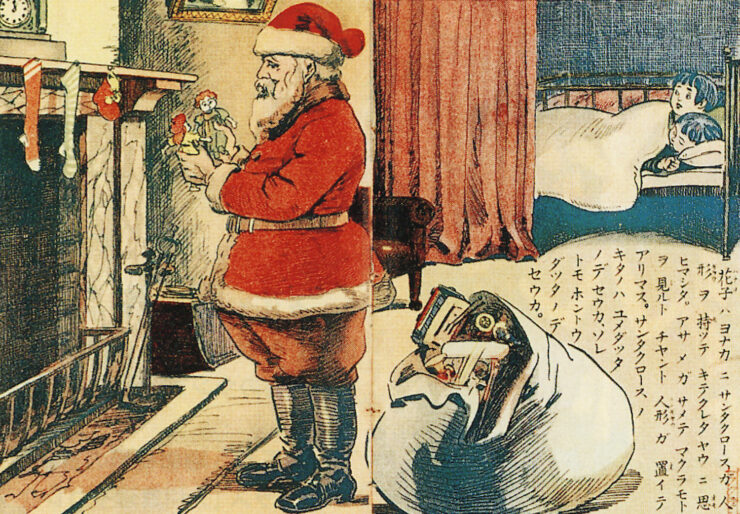
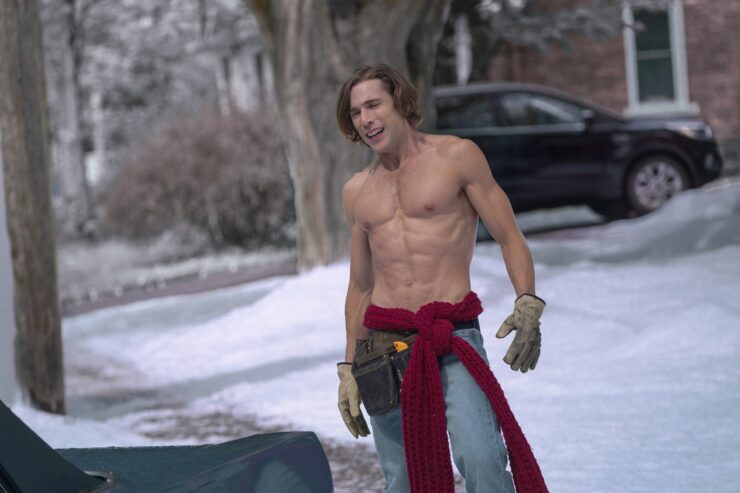
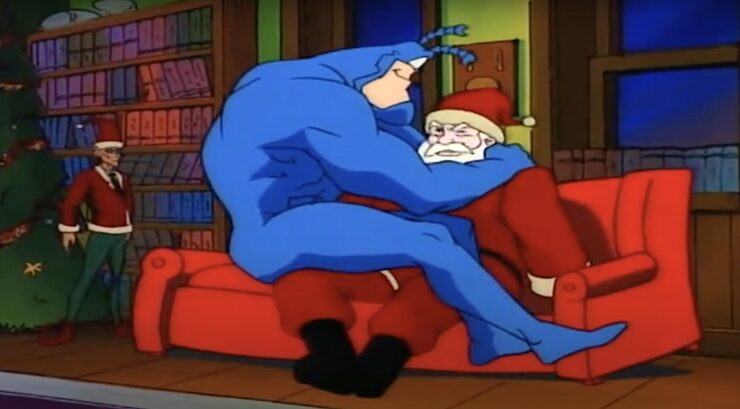
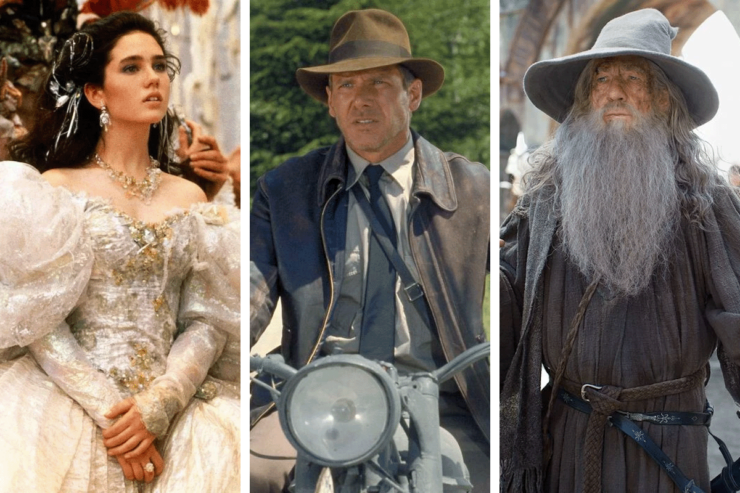
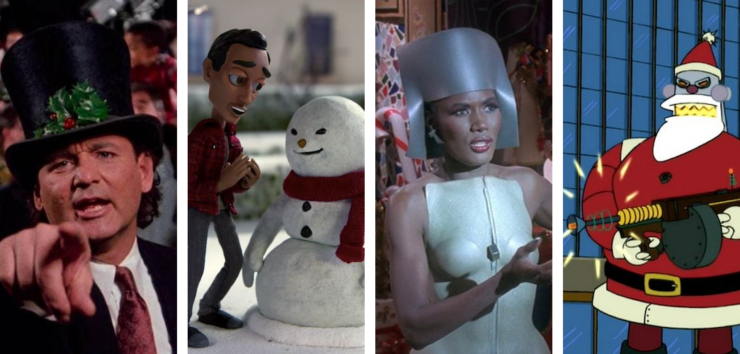
As an atheist who was raised as a (very skeptical) Catholic school boy Christmas was never anything but Santa Claus and magic to me. Even after some dick of a neighborhood kid spilled the reality beans and spoiled it all for me when I was only five I clung to the mythology and spirit of Santa that much harder because it felt so right. We really do need a little childhood magic in our life if only fleetingly once a year. I hate the consumerism and fabricated familial obligations most people indulge in this time of year but I happily cocoon myself at home with my cats amd my stash of Christmas music, movies and books and quite effectively recapture that magic again.
This was a lovely piece. Thank you.
As somebody who absolutely rails at all the STUFF (I am almost pathologically anti clutter) and NOISE and expectation and performative joy/jolliness around a lot of Christmas celebrations (both secular and religious) – usually at a time when SAD is in full force – I absolutely feel this. ((Hallowtide on the other hand? That’s my jam.))
Also being in Catholic circles this can be an area of intense debate. To Santa or Not To Santa? Now, I’m actually fiercely anti-Santa and we never did it with our kids in the sense that they ever believed there was a being called Santa who came down chimneys (or into apartments) and brought toys. Ironically, not even so much due to religious reasons (although I do personally feel St. Nicholas celebrations kind of fill that hole for us – but again, they know it’s their dad putting candy in their shoes) – you’ll find lots of Catholic moms who bend over backwards to make sure their kids still believe – but just due to my very pedantic nature, the same one that has drawn me into science and software development. It’s just not TRUE. If my kids ask, I give them a true answer. I just don’t get all the anxiety over ‘oh no, I think my kids are starting to suspect, how do I keep this lie going?’ Why???? What do we gain out of it???? Oh man I have been REAMED OUT for suggesting to just…not, because THE MAGIC.
(Never mind the kind of uncomfortable implications that arise when you realize Santa doesn’t treat everybody – even the Nice ones – equally but that’s a separate grievance with the whole idea.)
Trust me, I am not the Grinch I appear and my kids have plenty of fun and special memories around the holidays. And that includes Santa stuff – we do the cookies (and will leave a few crumbs on Christmas morning) and the carols and maybe a picture with Santa if it comes up. Santa comes to our big holiday/family reunion party to give a gift on Christmas Eve. My kids just know it’s all pretend, but it’s FUN to pretend, and to take part in a cultural moment. We talk about Santa like we might talk about Luke Skywalker or Frodo or any other character. Just because they aren’t ‘real’ doesn’t mean they aren’t ‘true’, if that makes sense, They are inspired by a multitude of things, and inspire US to true and good things.
I am not sure if my 10 year old (who has a mind like mine) ever really believed, although I think my 11 year old might have just due to other cultural influences, but gradually/naturally grew out of it. I didn’t go out of my way to disabuse him of the belief, we just never encouraged it either.
Anyway yes, I love the general premise of this article that Santa is not and should not be about the ‘stuff’.
I’m posting this comment as an unregistered user using dev barrelny email
My favorite Santa story is from the children’s book “The Good Master” by Kate Seredy (a great book with a title that aged poorly — it should maybe be called the Good Steward, since it is about taking care of the land and the people where you live, which is rural early 20th century Hungary in this case). At the end of the book, the children (a pair of cousins) go to meet “Santa Claus” at the train station. They visit every house in town putting gifts into the shoes the local kids put out for them. When they get to the last, poorest house, they have run out of gifts. So the cousins give away their own presents. And then the realize that “Santa” was the girl cousin’s dad, who she hasn’t seen in almost a year, and they realize that the true Santa is what they give to others, and the love and relationships between the members of a community, and it’s great!
I also really like the picture book “Wake Up Dormouse, Santa Clause Is Here!” which is about a little dormouse who always hibernates through Christmas, but really wants to meet Santa. Very magical. I appreciate a Santa who visits all the woodland critters.